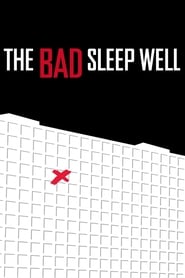Such a lot of promise, but such a sprawling second half with its jarring changes of tone and explicit, moralising subtext-made-text in the last 30 minutes. Highs and Lows, you might say.
A resurrection of the 1930s “tendency films,” which had been outlawed by the wartime government, the shakai-mono blossomed in the postoccupation ruins of Japanese cinema, fertilized first by the rather saccharine satirical impulses popular during the period, and soon cultivated for use as increasingly bitter, and sometimes altogether emetic, medicinal herbs.
— Chuck Stephens (Criterion)
Synopsis: In this loose adaptation of "Hamlet," illegitimate son Kôichi Nishi climbs to a high position within a Japanese corporation and marries the crippled daughter of company vice president Iwabuchi. At the reception, the wedding cake is a replica of their corporate headquarters, but an aspect of the design reminds the party of the hushed-up death of Nishi's father. It is then that Nishi unleashes his plan to avenge his father's death.

